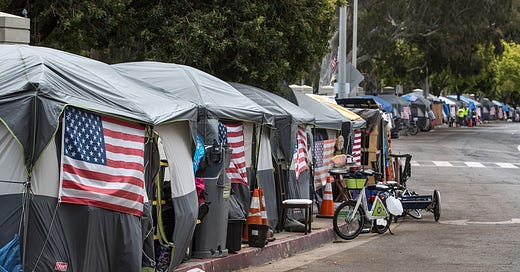Veteran homelessness: An epic government scandal hiding in plain sight
America’s unhoused vets crisis is a story of government malfeasance, neglect, graft… and even death.
At the height of the COVID-19 pandemic, when millions of Americans were sheltering in their homes and banging on pots and pans to celebrate the heroics of medical professionals, a curious sight popped up along a sidewalk in Los Angeles: dozens of uniformed tents, all pitched in a neat row, each adorned with large, crisp, level American flags.
On one side of the tents was San Vicente Boulevard, a busy thoroughfare full of speeding cars and idling engines. On the other was a wrought iron fence, a barrier that kept the veterans off the vast, green lawn of the West Los Angeles Veterans Affairs campus. From their perch on the sidewalk, America’s war heroes had a perfect view of the property, which dared them to dream about living on the other side.
This massive chunk of valuable Los Angeles land was donated to the federal government in 1888, specifically for housing disabled soldiers. Ten years later, 1,000 veterans lived there. Over the next 30 years, 91 buildings were constructed, providing care and lodging to 2,300 service members. By the early 1950s, 5,000 veterans called the campus home.
Today, more than 3,800 unhoused veterans live on the streets of LA — the homeless veteran capital of America. Why? The answer is a scandal in plain sight, a story of government malfeasance, neglect, graft, and even death.
Out today, Long Lead’s latest feature, “Home of the Brave,” is the story of how 388 acres of the world’s most valuable real estate were slowly taken from military veterans — and how they’re now fighting to take it back. This seven-part, multimedia feature includes a veteran-produced documentary film, transports audiences to this once proud “old people’s paradise,” and chronicles a centuries-spanning land war between the U.S. government, local forces, and generations of vets seeking a place to call home.
This summer, a group of disabled veterans seeking permanent housing on the West LA VA campus are taking the federal government to court. Through the class action lawsuit, Powers v. McDonough, they hope to compel the VA to build more housing, faster, on this land. At issue in the trial isn’t just the fate of these unhoused service members, but perhaps an entirely new way of approaching veteran care. If VA’s mission is to care for those ‘who shall have borne the battle,’ where does that care begin and end? Powers v. McDonough has the potential to extend the VA’s purview beyond its hospital walls and back into the realm of housing, as it originally was on this property.
Telling the full story of the West LA VA, from the property’s founding to the legal fight to take it back, the team behind “Home of the Brave” explores the crisis of veteran homelessness from all angles. Los Angeles-based journalists Samuel Braslow and Andrew Nusca provide street-level views of what it’s like to be under-served service members in America today. Jasper Craven, an investigative reporter who specializes in covering the VA, explores the decades of graft and inappropriate land use that has kept veterans from being housed on the land. And Army veteran and documentary filmmaker Rebecca Murga — supported by drone footage from photojournalist and Marine veteran Russell Midori — gives the unhoused veterans a voice in the feature, capturing their lives and struggles in a short film.
Lastly, Meghann Cuniff, whom the Washington Post calls “arguably the most influential legal journalist working today,” will provide daily news briefs and reporting from the landmark trial. From pretrial procedures through the lawsuit’s conclusion, the Home of the Brave newsletter is the best place to follow the veterans’ fight for housing at the West LA VA.
We will share more about “Home of the Brave” in the weeks and months ahead. Until then, thank you for supporting our work. You can enjoy more about Long Lead’s award-winning, longform journalism at LongLead.com.
So long for now,
John Patrick Pullen
Founding Editor, Long Lead







